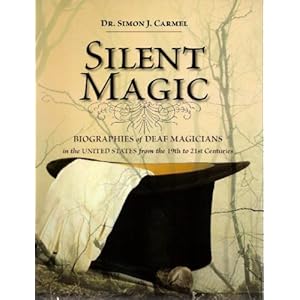I wanted to share this with you all. Not only because this is a great and interesting book. But also for the fact that I'm honored to be one of the many deaf magicians that's in this book. It contains the biographies of deaf magicians all the way back to the 19th century. There's more history in "Deaf" and "Magic" then some might think.
It's ironic that I got into magic at about the same time I became deaf. So when Simon Carmel asked if he could interview me to be in this book I was honored. I've meet him once and he's quite a guy.
Silent Magic: Biographies of Deaf Magicians in the United States from the 19th to 21st Centuries

Here's a review:
I don't think they allow links to books like this here. So I'll just say that I know it's available from Amazon. Not sure what other book stores carry it though.
Ron Jaxon
It's ironic that I got into magic at about the same time I became deaf. So when Simon Carmel asked if he could interview me to be in this book I was honored. I've meet him once and he's quite a guy.
Silent Magic: Biographies of Deaf Magicians in the United States from the 19th to 21st Centuries

Here's a review:
Those who do not hear...
A review of "Silent Magic" authored by Dr. Simon J. Carmel
Reviewed by Joel A. Moskowitz M.D.
August 12, 2008
"Silent Magic" is what, sadly, many acts would be better off being. The book title, "Silent Magic" does not, however, refer to acts without patter or mimes. It is a chronology scholarly compounded by a Renaissance man of many letters who, himself, is also a magician who is deaf. Dr. Simon J. Carmel is a physicist, cultural anthropologist, illustrator and paradoxically a linguist! Biographies of fifty United States magicians, renown and not, who were totally or partially deaf is the theme of his soft covered 158-page book.
Aside from marveling at the determination of those who cannot hear or speak who have pursued the arts of conjuring, what would the value of this book be to the hearing magic enthusiast? It is interesting to discover that Okito, Theo Bamberg, was deaf but many others described by author Carmel are not well known. Dr. Carmel expresses his wish that this book will inspire other deaf persons to develop an interest in performing, not only magic but as actors, clowns, and dancers.
When this reviewer was asked to become Medical Director of a large Psychiatric Hospital and Community Mental Health Center in Los Angeles, believing that psychiatric services should be offered in a multicultural setting, I was gratified to learn that the hospital was the venue for the first psychiatric program for the mentally ill deaf in the State of California. Thus I became familiar with some of the special interests and needs of the culture of deaf persons. Hence my interest in reviewing Dr. Carmel's book.
Returning to the question I posed above: How is this book going to help hearing and speaking magicians? Simply stated "Magic is a form of communication". Prior to 1890 it was unheard of (not a pun) that a magician would attempt to perform without speach. Theo Bamberg lost his hearing at age 17 and suffered consequent speech impediment as well. It seemed it would be the last of five generations of magicians. When Theo proposed that he masquerade as a Japanese magician who didn't speak, his father thought him ridiculous But it worked! Although not deaf, Horace Golden, who advertised himself as a whirlwind illusionist with no time for talking astounded audiences without the `benefit' of patter.
It was once the style for magicians to accompany their mystifications by reciting inane (my opinion) poetry (see Tarbell Courses). Other magicians appear to require their own noise to relieve their tension on stage. Truly distracting it is often offensively dull. Such books as "Scripting Magic" by Peter McCabe and the Hollingworth's writings teach that entertainment is predicated on preparation which includes a theme. Hanussen in his "Mentalism and Telepathy" emphasized the value of studying gestures. His knowledge of the influence of gestures educated Hitler to bewilder the masses. While not inferring that the hand signs of deaf persons is at all similar in motive, the subtle yet powerful aspects of non-verbal communication should be entertained by all magicians.
While viewing some acts at the recent IBM/SAM convention, I regreted that more wasn't made of musical accompaniement. Pierre Brahma, a French magician, developed a clever system which permitted him to perform to music which he, himself, could not hear. A spotlight told him so he could adjust his pace to the music.
When the reader learns that it is possible to hypnotize deaf subjects, as the biography of James E. Casey indicates, you must admire the inventiveness. Morton A. Feldman, another hearing impaired magician, overcame the challenge of performing for deaf-blind persons! Far from being handicapped or a victim of a sense deficit, the stories of these life-winners encourage those who are disabled by lack of creativity to stimulate their thinking.
I don't think they allow links to books like this here. So I'll just say that I know it's available from Amazon. Not sure what other book stores carry it though.
Ron Jaxon


